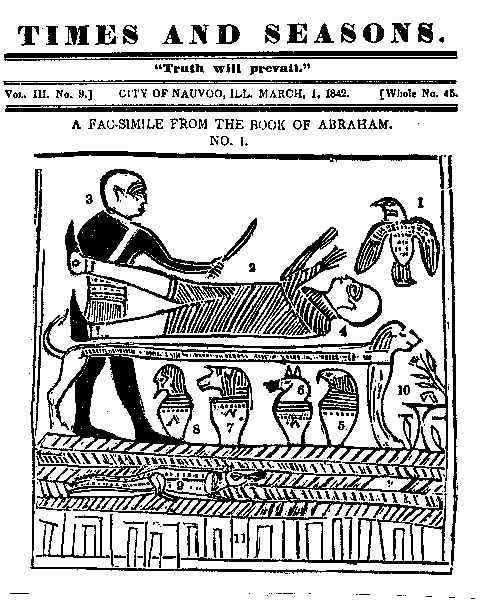With the release of the latest Gospel Topics article “Translation and Historicity of the book of Abraham” I have come to realize that the Church is making room for those with various beliefs about what our scriptures are. I see this as a tremendous step forward for the Church. The article helped me form some conclusions about where the Church is heading with its approach to scripture and history. Only the “Spiritual Confirmation” conclusion below is directly stated in the article while the rest are inferred from the article and other information related to the Gospel Topics articles.![]()
Nuanced and Pluralistic Views are Welcome and Legitimate
Due to the influence of correlation and tradition the book of Abraham translation story has been a simple faith-promoting one. The story consisted of the Church purchasing some papyri and mummies, Joseph sees that among the papyri are the “writings of Abraham”, and by the power of God he translates the writings of Abraham word for word. While some of the components of the traditional story are there, the article adds some more unknown details and moves away from this literal translation mindset. The largest step forward in my mind is the inclusion of the “catalyst theory.” While still maintaining that the book of Abraham is divine in essence it is about as far as you can get from literal translation.
Alternatively, Joseph’s study of the papyri may have led to a revelation about key events and teachings in the life of Abraham, much as he had earlier received a revelation about the life of Moses while studying the Bible. This view assumes a broader definition of the words translator and translation. According to this view, Joseph’s translation was not a literal rendering of the papyri as a conventional translation would be. Rather, the physical artifacts provided an occasion for meditation, reflection, and revelation. They catalyzed a process whereby God gave to Joseph Smith a revelation about the life of Abraham, even if that revelation did not directly correlate to the characters on the papyri.
What!?! While the catalyst view may have been acceptable in scholarly circles, it is groundbreaking to see it in an official church publication. This says, “we really don’t mind what your conclusions/theories are about the origin of scriptures, just that you respect them as such.” All I have to say is thank you for allowing me the liberty to form my own conclusions.
Prophets, Seers, and Revelators with the Assistance of Professional Historians Lack Consensus
From what I understand these Gospel Topics articles are put together by a group or council of paid Church historians to add clarity to some of the most controversial doctrines and history of the Church. The articles are reviewed by general authorities who give their stamp of approval after providing some feedback. See the “What about historical questions?” for a quick, 3-minute video on the process and purpose. While this may seem like a boring set of procedures it adds potency and authority to the articles. The men we regard as modern-day revelators do not have a single, unified consensus on these issues. In a way they are saying “if you find these issues troubling, confusing, unclear, interesting, faith-promoting, or faith-trying, then welcome to the club.”
Do Not Disparage the Church or its Scripture
The first statement of the article reads, “The Church of Jesus Christ of Latter-day Saints embraces the book of Abraham as scripture.” The first section of the article is “The book of Abraham as Scripture”, which expresses the importance of the book of Abraham for the clarification and addition of Gospel truths. This is a line in the sand. While the article does promote studying with a critical-eye, it maintains, unequivocally, that the book of Abraham is holy scripture. The article’s structure and rules are a way of modeling what is an acceptable Church dialogue on a topic such as the book of Abraham. While scholars outside of the Church context could argue that the book of Abraham was just more of Joseph Smith’s invented deceit, this type of claim is unwelcome at Church and not acceptable for a member of the Church.
These Articles are Apologetic in Nature
These Church articles are biased. Surprise! To think that the Church would publish an article that does not promote the faith is naive. I would not hold any other institution to that standard. In the article there is a major emphasis on the faith-promoting elements of a given topic; the whole section called The book of Abraham and the Ancient World is an attestation to this fact. There is also little emphasis on the harder aspects, but I do feel that the articles cover more of the ammunition of critics than I thought they would. I don’t consider myself an expert on the book of Abraham by any means, however, I was surprised to find a new challenging detail in the article. The article speaks of a grammar book that Joseph was putting together to make sense of the Egyptian found in the Papyri.
Some evidence suggests that Joseph studied the characters on the Egyptian papyri and attempted to learn the Egyptian language. His history reports that, in July 1835, he was “continually engaged in translating an alphabet to the book of Abraham, and arrangeing a grammar of the Egyptian language as practiced by the ancients.”This “grammar,” as it was called, consisted of columns of hieroglyphic characters followed by English translations recorded in a large notebook by Joseph’s scribe, William W. Phelps. Another manuscript, written by Joseph Smith and Oliver Cowdery, has Egyptian characters followed by explanations.
The relationship of these documents to the book of Abraham is not fully understood. Neither the rules nor the translations in the grammar book correspond to those recognized by Egyptologists today….
The fact that the grammar book was even brought up in the article increases my respect for the historians and general authorities involved.
Scriptural Truth is Verified Through Spiritual Confirmation
The last and concluding sentence of the article is, “The truth of the book of Abraham is ultimately found through careful study of its teachings, sincere prayer, and the confirmation of the Spirit.” Spiritual confirmation is the underlying emphasis of the article. The Book of Mormon Translation article ended in much the same fashion.
I have to agree with this assessment.
The only way that any writing or communication has any lasting power in your life is if it provides truths, inspiration, or positive direction in your life. For me this releases me from holding only the standard works as scripture. This also allows me to include fiction into my sources of inspiration or scripture. Please refer to article of faith 9 and 13 for further confirmation of this way of thinking.
Further Information
http://radiowest.kuer.org/post/scripture-translation-and-belief
http://www.sltrib.com/sltrib/news/58162708-78/book-abraham-translation-papyri.html.csp
http://janariess.religionnews.com/2014/07/10/mormons-need-book-abraham/





I really like this view of these topics pages. Thanks.
Jonathan,
I appreciate the feedback.
Love the pearl – the book that converted me…
Thanks for this. I fall in to the habit of being overly critical of the Church and church leaders for being too dogmatic way too often. Thanks for this perspective. I am hopeful that this new openness with history and controversy will make the Church a much better place.
Very nice discussion. Yes, the new essay certainly breaks new ground as far as mainstream LDS discussion of the Book of Abraham goes.
Daniel S,
Agreed. I believe this is the church’s only viable option with the ease of obtaining information today.
“I believe this is the church’s only viable option with the ease of obtaining information today.”
This is another way of saying that the Church would never have made such a public and honest assessment of the Book of Abraham—or for that matter, of any of the other topics covered in the essays posted on LDS.org—if the same information had not already been revealed elsewhere on the Internet. It’s difficult to give an organization credit for being forthright when its past policy of disinformation and misleading historical accounts has already been exposed.
Respected Mormon historian Terryl Givens said it best: “The problem is not so much the discovery of particular details that are deal breakers for the faithful; the problem is a loss of faith and trust in an institution that was less than forthcoming to begin with.”
EFF,
Yes. I agree with your points. The Church has not been a leader in transparency and historical accuracy. Having said that, it is making steps forward at an accelerating rate. The Church is growing up and confronting their history. I, for one, am grateful for the effort because I personally went through a time where I felt the betrayal of being misled.
I agree that the Church probably would not have posted these articles without the information being provided, in a different light, on the internet. This is a squeaky wheel gets the grease situation. The Church is feeling the effects of correlation and inaccuracy with their past. I don’t see a lot of evidence that one of the goals of the Church has been information repression. I see a lot of evidence that the goal of the Church has been faith-promotion, almost to an extreme. Accuracy and transparency were martyrs in that cause to some degree.
I transcribed this Quote from Mr. Givens when he was on Mormon Stories that I thought was directly applicable.
Great article, thank you! Will be sharing this with some family members.